
__________________________________________________
👏
Sport in Bangladesh is popular and widespread. The most popular sport in Bangladesh is cricket, Bangladesh being the top 9th team in the world,[1] followed by football (soccer), and kabaddi. kabaddi is the national sport of Bangladesh.
👏
Sports
[edit] Cricket
Cricket is a game which has a massive and passionate following in Bangladesh. There is a strong domestic league which on many occasions also saw Test players from many countries (Sri Lanka, India, Pakistan, England) gracing the cricket fields of Bangladesh.
Bangladesh has now joined the elite group of countries eligible to play Test cricket. The Bangladesh national cricket team goes by the nick-name of the Tigers—after the Royal Bengal Tiger which too calls Bangladesh its home.
The Cricket-Culture is not at all a new phenomenon in Bangladesh. As elsewhere in the subcontinent, the game itself was first introduced to the Ganges-Brahmaputra delta region by the British rulers nearly two centuries ago. For the better part of the British rule, cricket remained a recreational game for the aristocrats, inaccessible to the common people because of colonial class distinctions and the complicated nature of the game which the locals did not make out so easily. Following the bloody freedom struggle which ended in Bangladesh gaining independence in 1971, cricket has continued to grow. It was slow to start, other things having priority at the beginning.
Timeline 1780: It stands established that organized cricket in India began in Calcutta (current Kolkata), a major city of Bengal. Early English expatriates banded together to form the Calcutta Cricket Club. The earliest mention of this club is found in the 48th issue of Hicky's Bengal Gazette, dated 'from Saturday December 16th to Saturday December 23rd, 1780' where the newspaper reported that the 'Gentlemen of the Calcutta Cricket Club are getting themselves into Wind, and preparing to take the Field, for a very active Campaign'' (sic). With its tentative year of birth at 1780, the Calcutta Cricket Club becomes senior to the Marylebone Cricket Club, which was established in 1787, by a clear margin of seven years. The London-based MCC, which was till a few years ago the parent body of cricket, still holds an eminent position in the world of cricket.
1792: Englishmen residing in the districts of Barrackpore and Dum Dum play a cricket match (Source: February 23, 1792, the Madras Courier). This particular cricket match was in all likelihood played on the "maidan" opposite the Raj Bhavan. The assumption is based on the reason that a scorecard of another match played in January, 1804, survives to convey to us that teams representing Old Etonians and Calcutta Cricket Club duelled on the same ground. Incidentally, the year 1792 is officially recognized by Wisden cricket almanac as the date of establishment for Calcutta Cricket Club, making it the oldest surviving cricket club outside the British Isles.
1926: (Unofficial) Test cricket comes to Eden Gardens in Calcutta on the last day of 1926 with Arthur Gilligan leading the MCC team; India was still not an official test nation. MCC had come at the invitation of Calcutta Cricket Club and the Bengal Gymkhana was one of its principal patrons.
1934: The Ranji Trophy, named after the famous Indian cricket player Ranjitsinhji, commences in India.
1935: The first Bengal team takes part in the second Ranji Trophy.
1947: After the partition of Bengal in 1947, matches of domestic cricket in Pakistan were conducted in four leagues. Regional East Pakistani teams regularly took part in the first-class Quaid-e-Azam trophy from 1954 through 1968.
1955-1969: Seven international test matches with Pakistan participating as the host team were played in Dhaka between 1955 and 1969.
The first test was held between Pakistan and India in January 1955. The match started on the first day of the year. The newly-built Dhaka Stadium then had the maximum capacity of accommodating 15,000 spectators. According to an old follower of Dhaka cricket, the full house crowd gave a standing ovation to both the captains, Abdul Hafeez Kardar and Vinoo Mankad, as they walked out to toss. The match was drawn.
The next match at the Dhaka Stadium was played between Pakistan and New Zealand from November 7 to 12 the same year. Legendary batsman Hanif Mohammad scored his second Test century (103). Besides, his compatriot Khan Mohammad returned with his career best bowling figures of 6 for 21. This match also ended in a draw.
The third Test was played at the Dhaka Stadium between Pakistan and West Indies in March 1959. In the low-scoring match, Pakistan recorded their only Test win at Dhaka by 41 runs, mainly because of their famous fast bowler Fazal Mahmood, who took 12 wickets, six in each innings, for 100 runs.
Then came Australia in the November of the same year under the leadership of Richie Benaud and they defeated Pakistan by eight wickets. This was also Pakistan's only Test defeat at Dhaka.
The fifth Test at the Dhaka Stadium was played in January 1962 between Pakistan and England. Although the match ended in a draw, it was a personal landmark for Hanif Mohammad who scored centuries (111 and 104) in both the innings.
The next match was also played between Pakistan and England after seven years in February 1969. The most notable feature of the match was the presence of all-rounder Basil D'Oliveira, who scored an unbeaten 114 in the first innings.
The last, but not the least, Test between Pakistan and New Zealand was played in November of the same year. Kiwi skipper Glen Turner hammered a century (110) in that match, which also concluded in a draw.
1972: The Bangladesh Cricket Control Board is established. Soon after, a cricket league commences in Dhaka and Chittagong. It is a slow start, other things having priority in the war-torn country. Early in 1975 the Dhaka (then "Dacca") stadium was still in disrepair, the square having sunk several inches and the the Press Club shell-torn.
1974/75: A national level cricket tournament begins in the country. 1st division and 2nd division cricket leagues start at the districts level. Other tournaments that were organised included National Youth Cricket, Inter-university Cricket, College & School Cricket, Shahid Smriti Cricket, Damal Summer Cricket and Star Summer Cricket.
1976/77: Robin Marlar writes Whither Bangladesh?, a detailed description of Bangladesh cricket's state of affairs and an yearning to see Bangladesh in the international stage. Bangladesh Cricket Board officials become more alert and enthusiastic after this international exposure.
After the completion of the 1975-76 domestic season, Bangladesh Cricket Control Board's acting secretary Reza-e-Karim writes to the International Cricket Council (then called the International Cricket Conference), requesting ICC membership status for Bangladesh. The ICC replies, suggests the BCCB to invite the Merelybone Cricket Club, and that their decision rests on MCC's post-tour report.
Reza-e-Karim drafts the first constitution of the BCCB and in May, 1977 invites the MCC to Bangladesh. In June, 1976, the membership of Bangladesh is discussed in an ICC meeting. The meeting decides to finalize Bangladesh's membership status after the MCC tours Bangladesh.
The MCC arrives at Dhaka for their first Bangladesh tour on December 27, 1976 and helps build the enthusiasm; over 40,000 people attends the representative match at Dhaka.
On July 26, 1977, Bangladesh becomes an Associate member of the I.C.C.
The BCCB seeks coaching help from the MCC. The MCC sends Bangladesh her first foreign cricket coach, an Englishman named Robert Jones.
1978: In January, Sri Lanka, yet to be a test team, tours Bangladesh.
In February, the Deccan Blues, an Indian team comprising of famous first-class cricketers, tours Bangladesh for a three-day match against the BCCB XI.
In December, the MCC arrives in Bangladesh for the second time in a tour that lasts until Jan 14, 1979.
1979: Bangladesh appears in the first ICC trophy in England. Bangladeshis win matches against Fiji and Malaysia.
1980: In January, Pakistan tours Bangladesh for a 2-day match in Chittagong and a 3-day sellout match in Dhaka. The crowd's misbehavior toward Pakistani players abruptly ends the Chittagong match, and the tour.
1980/81: The MCC tours Bangladesh for the third time.
1982: An Indian first-class team, the Hyderabad Blues, boasting five Indian test players, wisits Bangladesh in January.
In May-July, 1982, Bangladesh takes part in its second ICC trophy competition and finishes fourth among sixteen national teams.
1983: In March, 1983, a West Bengal team tours Bangladesh. In December, Bangladesh follows up with a visit to the Indian state.
1984: In January, 1984, Bangladesh hosts the first ever Sout-East Asia Cup; Singapore and Hong Kong participates. Bangladesh beats Hong Kong in the final to take the trophy.
In February, Bangladesh team tours Kenya for the first time.
Having returned from Kenya, in late February, Bangladesh hosts a series of cricket matches with Pakistan's PIA and India's the Hyderabad Blues.
1985: The Sri Lankan test team visits Bangladesh in March for a three-day match in Dhaka.
1986: In January, 1986, the Omar Kureishi XI containing Pakistani test cricketers visits Bangladesh.
In March, 1986, Bangladesh takes part in the Second Asia Cup in Sri Lanka, and plays its first ever one-day international match against Pakistan (Bangladesh was still not a full member of ICC). The tournament gives Bangladesh players international exposure.
In June, 1986, Bangladesh flies to England to take part in the third ICC tropy.
Later in the year, Bangladesh tours Pakistan for the first time.
1988: In January, Bangladesh takes part and wins the second South-East Asia trophy, defeating Hong Kong.
The Third Asia Cup takes place in Bangladesh in October-November 1988 with India, Pakistan and Sri Lanka participating as well as the host country.
1989: In August-September, Bangladesh U-19 team tours England.
In December, 1989, Bangladesh hosts the First Under-19 Asia Cup.
1990: The Deccan Blues, captained by Syed Kirmani, tours Bangladesh in January and February. On February 4, 1990, pyjama cricket comes to Bangladesh, as the first ever day-night match is played in the Dhaka stadium between BCCB U-25 and the Deccan Blues.
In February, 1990, a team from Denmark tours Bangladesh.
In March, 1990, Pakistan and India takes part in a two-match series. Bangladesh, the host country, is a surprising absentee.
In April, 1990, Bangladesh takes part in the Australasia Cup in Sharjah and plays against New Zealand and Australia for the first time in group matches.
In June, 1990, Bangladesh participates in the fourth ICC trophy held in Holland. Bangladesh finishes third in the tournmaent, losing in the semifinal against eventual champions Zimbabwe.
In December, 1990, Bangladesh visits India to take part in the fourth Asia Cup cricket along with India and Sri Lanka.
1990: West Bengal visits Bangladesh in February. A little-known West Bengal batsman Saurav Ganguly scores a century and a half-century to help West Bengal prevail in both matches.
1992: In June, Bangladesh takes part in the third South East Asia cup and wins the trophy again by defeating Hong Kong.
In December, 1992, Bangladesh hosts the first SAARC cricket tournament. But the tournament comes to an abrupt end with two matches to go, as tensions in Dhaka rise after the Babri mosque incident.
1993: In March-April, 1993, the Karachi Airport Gymkhana team tours Bangladesh.
1994: Bangladesh takes part in the fifth ICC Trophy and fails to qualify for the semifinals.
1997: Bangladesh wins the sixth ICC trophy in Malaysia. Bangladesh also becomes a regular ICC member with the right to play one-day internationals.
1998: Bangladesh posts its first ODI win against Kenya in India. In October, Bangladesh hosts (although did not participate in) the first ever "Mini World Cup", a knock-out ODI tournament featuring all the test playing nations.
1999: Bangladesh performs in the 7th Cricket World Cup in England. In a group match, Bangladesh defeats Pakistan.
1999-2000: A new first-class format National League is launched. The home and away tournament has divisional teams from Dhaka, Chittagong, Sylhet, Khulna, Barisal and Rajshahi.
2000: Bangladesh attains the status of a test playing country on 26 June. Bangladesh's inagural test match takes place in Dhaka against touring India on 10-14 November, 2000
2004: In December, Bangladesh team wins its 100th ODI with a 15-run victory over World Cup Runners-up India at the Bangabandhu National Stadium in Dhaka, It was Bangladesh's overall sixth win in one-dayers, but the first ODI victory on home soil. It was also only their third win against a Test-playing nation after defeating Pakistan in the 1999 World Cup in England and beating Zimbabwe in March, 2004.
2005: In January, Bangladesh records their maiden test victory with a thumping 226 runs win over Zimbabwe. This was the 35th test for Bangladesh. Bangladesh team also secures its first ever Test and ODI series wins.
In June, Bangladesh defeats world champions Australia in a Natwest Series ODI match. Mohammad Ashraful is the hero with a run-a-ball century. Early in 1975, the Dhaka (then "Dacca") stadium was in disrepair, the square having sunk several inches and the Press Club shell-torn. The M.C.C. tour in 1976/77 helped to build the enthusiasm; over 40,000 people attended the representative match at Dhaka. In 1977, Bangladesh became an Associate member of the International Cricket Council. Two further M.C.C. teams toured in 1978/79 and 1980/81.
The standard of cricket quickly rose, and soon Bangladesh was the top ICC associate country in the region, winning all ACC tournaments. This gave them the opportunity to play in the Asia Cup, against teams like India, Pakistan and Sri Lanka. The Third Asia Cup took place in Bangladesh in 1988 with India, Pakistan and Sri Lanka participating as well as the host country.
In 1989/90, Bangladesh played hosts to the First Under-19 Asia Cup. In 1997, Bangladesh won the ICC Trophy in Malaysia, qualifying for its first ever world cup appearance. Soon after, Bangladesh, along with Kenya were granted full ODI status by the ICC. Bangladesh posted its first ODI win against Kenya in India in 1998. In October of 1998, Bangladesh hosted—although they did not participate—the first ever "Mini World Cup", a knock-out basis ODI tournament featuring all the test playing nations. In 1999, in their maiden appearance at the World Cup in England, Bangladesh defeated fellow ICC associate Scotland, and then won a match from favorites Pakistan.
As a reward of bright performance in ICC and World Cup, Bangladesh was given the status of the 10th test playing nation on the 26 June 2000. As the famous ex-cricketer Ali Bacher of South Africa noted during his visit to Dhaka, 'the game of cricket has great prospects in a country like Bangladesh where there is cricket on the streets, cricket in the schools, in the villages, a competitive league, and Friday cricket—drawing crowds of spectators who love the game in all its forms.' The game, having shed its aristocratic restrictions, prospers at the very grass-roots of Bangladeshi society.
In the 2007 Cricket World Cup on March 17, 2007, Bangladesh beat India by a 5 wicket margin to advance to the Super 8 stage, where they beat South Africa by a 67-run margin on April 7, 2007.
[edit] Kabaddi
Kabaddi is a team game. Two teams of seven players occupy opposite halves of a field of 12.5m x 10m divided by a line into two halves. The teams take turns sending a "raider" across to the opposite team's half, where the goal is to tag or wrestle ("capture") members of the opposite team before returning to the home half. Tagged members are "out" and are sent off the field. The raider must not take a breath during the raid, and must prove it by constantly chanting (called 'cant' or 'dak') during the raid. Meanwhile, the defenders must form a chain, for example by linking hands; if the chain is broken, a member of the defending team is sent off. The goal of the defenders is to stop the raider from returning to the home side before taking a breath.
In 1980, Bangladesh became the runners-up in the first Asian Kabaddi Championship and India emerged as the champion. Bangladesh became runners-up again in the next Asian Kabaddi Championship held in 1985 at Jaipur, India.
Bangladeshi kabaddi team won the bronze medal at the 2006 Asian Games.
[edit] Football (Soccer)
Football is popular in Bangladesh. Bangladesh is currently ranked 158th in the FIFA ranking. Bangladesh became the 2003 South Asian Football Federation (SAFF) champion. SAFF includes Southern Asian countries and other countries from Asia.
The Bangladesh national football team is the national team of Bangladesh and is controlled by the Bangladesh Football Federation. It is a member of the AFC. The side has yet to qualify for a FIFA World Cup tournament. They were dismissed in the first round of their only Asian Cup appearance to date in 1980, and have been South Asian champions once, in 2003. As is the case elsewhere on the subcontinent, top-level football in Bangladesh is played somewhat in the shadow of the country's test cricket team. The team was founded in 1972, and joined FIFA in 1974.
Apart from wins over Indonesia and Thailand in their first ever World Cup qualification in 1986, Bangladesh has struggled to impose itself. At the regional level, they have also remained in the second echelon while in Asia, the team is constantly trying to avoid being the wooden spoon of their group.
However, the Association is currently working hand in hand with the Vision Asia programme which will see it restructuring its domestic league as well as initiating more youth programmes. These initiatives are coming at the right time for football in Bangladesh.
Football in Bangladesh has a huge following which was exemplified when the national team made history in their victory at the South Asian Football Federation Cup in 2003. The South Asia side won the final via penalties over Maldives before 50,000 home supporters.
Kazi Salahuddin is Bangladesh's most famous footballer, having played professional football in Hong Kong, the first Bangldeshi player to ever do so.
Another famous player is Chingla Mong Chowdhury Murruy. He is a renowned soccer personality in Bangladesh. He used to play before the liberation war. He coached brtc, was an advisor in bksp, and also received his national award in football. He also fought in the liberation war in 1971 for his country.
[edit] Sports organisation
Sports organisation in Bangladesh has undergone many changes in different periods before and after its independence. The Bangladesh Sports Control Board was established in 1972. There are 29 registered federations under this board. These include federations for popular games such as football, cricket, hockey, tennis, badminton, volleyball, handball, chess, and carom as well as for wrestling, weightlifting, squash, billiard, and snooker, which are less popular in Bangladesh. Other recognised sports organisations in the country are the district and divisional sports organisations, university sports organisations, and the sports bodies of the armed forces, police and ansar, as well as of public sector corporations, boards and departments such as Bangladesh Biman, BJMC, BTMC, PWD, and Bangladesh Railway.
[edit] Sports Clubs
Sport clubs have a significant contribution to the development of sports in the country. Prominent among the clubs of Bangladesh are Abahani Krirachakra, Arambag, Ajax, Azad Sporting, Brothers Union, Dhaka Mohammedan Sporting, Dhaka Wanderers, Dilkusha Sporting, GMCC, Kalabagan, Muktijoddha Sangsad, Rahmatganj, Suryatarun, Victoria Sporting, and Wari. Some of these clubs are reputed for their glorious past while others earned a name by excellent performance at national level at present.
-
Abahani Krira Chakra
Mohammedan Sporting Club
Arambag Club
Azad Sporting Club
Brothers Union Club
Victoria Sporting Club
- Wari Club
[edit] Arambag Club
Arambag Club was established in Dhaka in 1958. It was at first a football club, but later became active in other games like handball, basketball and volleyball. The club has had continued success in different tournaments. It became champion in the 4th and 5th Shital Women's Handball competitions. In 1980, it was champion in the Alpha Cup Football Tournament of Nepal and, in 1995, runner up in the eighth Chief Minister Gold Cup Football Tournament of Sikkim and in the Nagji Gold Cup Tournament of India. In 1997, the club took part in a football tournament at Agartala that marked the golden jubilee of the independence of India. In the same year, it became runner up at home in the Federation Cup Football Tournament.
[edit] Azad Sporting Club
Azad Sporting Club was founded at Dhaka in 1949. Main patrons of the club were the writers, poets, painters, actors, and publishers. Its football team was promoted from the second division league to the first division in 1951 and in 1958, it became champion of Dhaka's first division football league. Azad Sporting is not a prominent club now in terms of its performance in different championships, but it is given special credit because of its role as a school of training up young sportsmen. The club prepares not only football players but also athletes, cyclists, and the players of basketball, volleyball, hockey, cricket, and badminton.
[edit] Brothers Union Club
Brothers Union Club was established at Gopibag, Dhaka in 1949. The club, however, remained little known until 1973, when it first appeared in the third division football league and became its champion of that league. The next year, it played in the second division football league and as the champion of the season, it was promoted to the first division. Ever since the club has had continued success and, in course of time, it became the third most powerful football club of the country next to Abahani and Mohammedan. Brothers Union also performs well in cricket, chess and handball.
In 2004 and 2005 they became champion in senior division football league.Football lovers really want their beloved orange dream team to be the number one again in 2006.
[edit] Victoria Sporting Club
Victoria Sporting Club, named after Queen Victoria—the club was established by a group of zamindars of the Tejgaon and Kurmitola areas of Dhaka in 1903. Initially, it was a football club, but later, it started taking part in hockey and cricket in the 1930s. The club became champion in Dhaka's first division football league championship in 1948. In 1960 and 1961, it finished the same as runner up but, in 1962, it clinched the championship title in four major football tournaments of Dhaka, including the first division league. That year, it played with South Korea in the final match of the Aga Khan Gold Cup Tournament and defeated her by five goals to one. The club, however, failed to sustain its reputation of a grade one football team. It is now known as a medium class team in Dhaka's first division football league. But it performs well in games like badminton, boxing, wrestling and weight lifting.
[edit] Wari Club
Wari Club was established in 1898 by a number of enthusiastic sports organisers under the leadership of Roybahadur Surendranath Roy of the Wari area of Dhaka. The club, however, took a regular shape only in the 1920s, when it acquired a playground in the Paltan area of the city and also constructed an office near it. Wari is a special club known for its glorious achievements in football at different times. It became widely known in 1910, when it defeated the Royal Palace Football Team in a charity match. In a friendly match in 1917, Wari defeated Lincolin Club, which was the first division football league champion. In 1937, Eilington Corinthian, a famous European football team of that time, toured India, and the local team with 10 players of Wari stopped its rally of remaining unbeaten in a row. Even today, Wari is always considered a threat to big football teams, who often lose matches in encounters with it. Wari has a good record in other games also. It became champion in three consecutive years in the Dhaka cricket league (1951-1953) and in the Dhaka volleyball league (1972- 1974).
[edit] Traditional Sports
Traditional Sports of Bangladesh are still practiced mostly in rural areas. All are not equally favorite now because of the invasion of western games. "Hadudu"(also known as 'kabaddi') is the only internationally recognized traditional sport of Bangladesh. Besides "dariabandha", "gollachut", "satchara", "borofpani", "birinchi", "kutkut", "kanamachi", "tillo", "Sologuti", "Bagh-chagol" etc are still popular in sub-urban and rural areas.
👏
Love,
AF😉
**viewbie's note: post all kinds of sport related topics here. any other thread opened for this topic will be closed.
-BSF Dev. Team







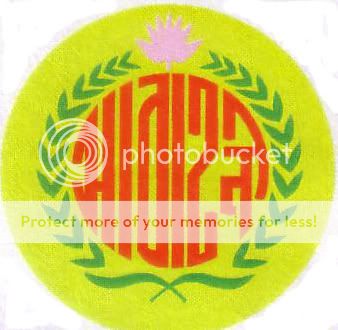
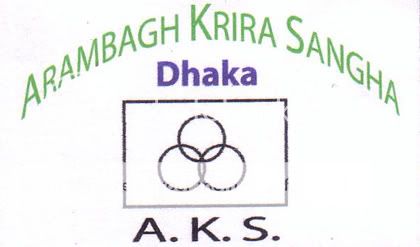
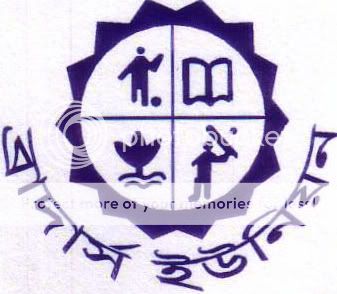
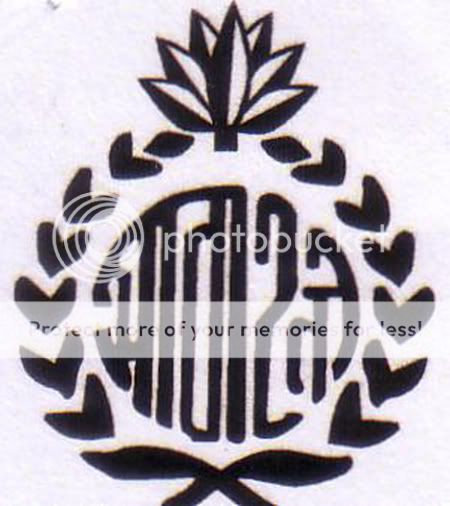
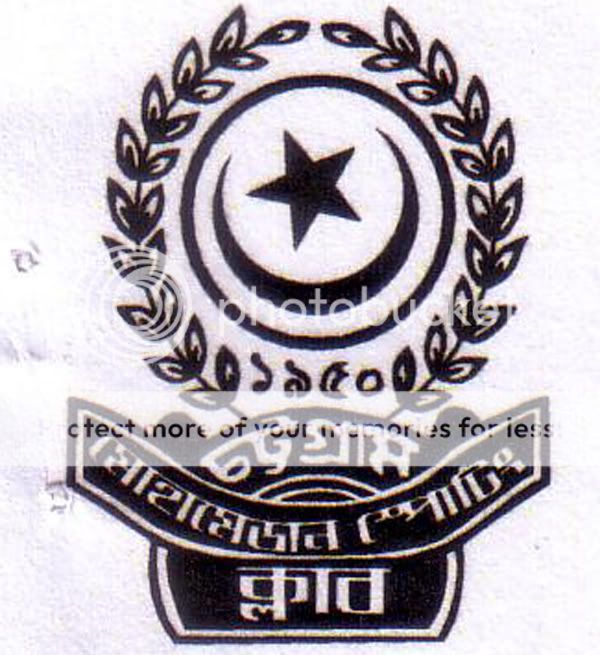
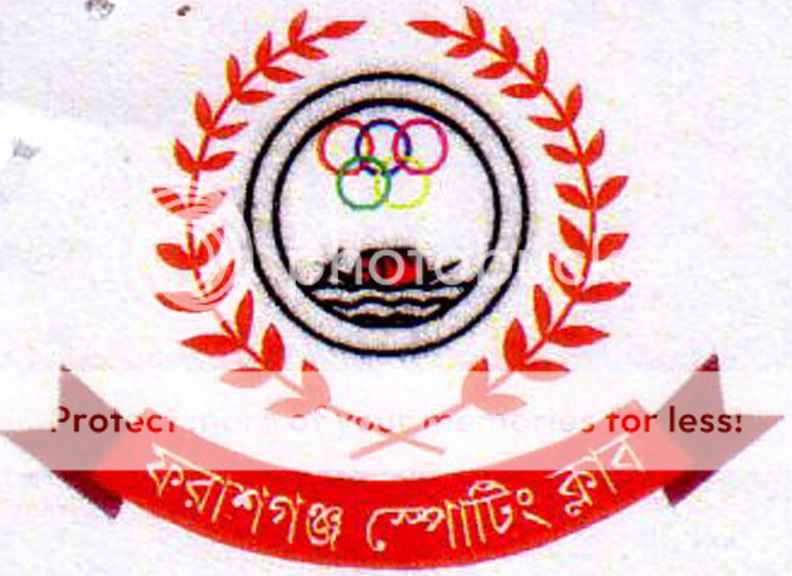
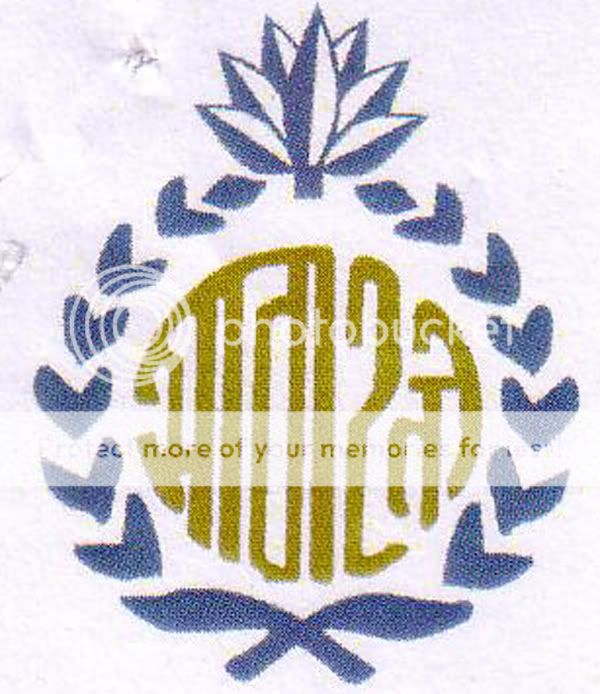
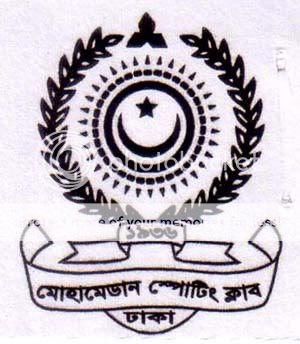
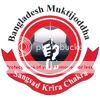
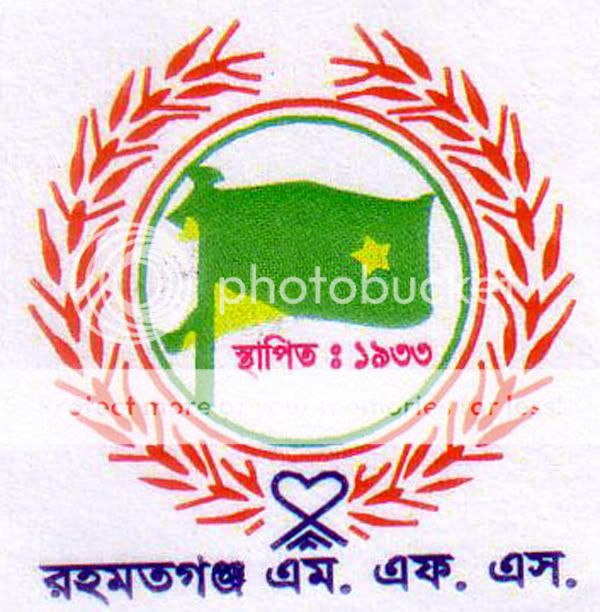
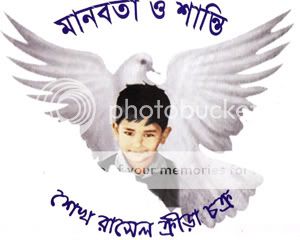
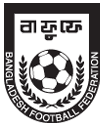 The Bangladesh Football Federation (BFF) was formed on 15th July, 1972. The then Education, Culture and Sports Minister Prof Md. Yousuf Ali headed the 25-member maiden Adhoc Executive Committee. The late Abul Hashem of Wari Club was the General Secretary.
The Bangladesh Football Federation (BFF) was formed on 15th July, 1972. The then Education, Culture and Sports Minister Prof Md. Yousuf Ali headed the 25-member maiden Adhoc Executive Committee. The late Abul Hashem of Wari Club was the General Secretary.
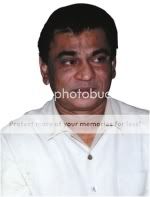 Personal Life
Personal Life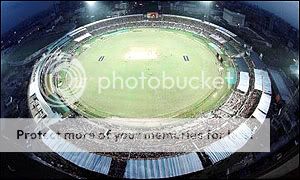
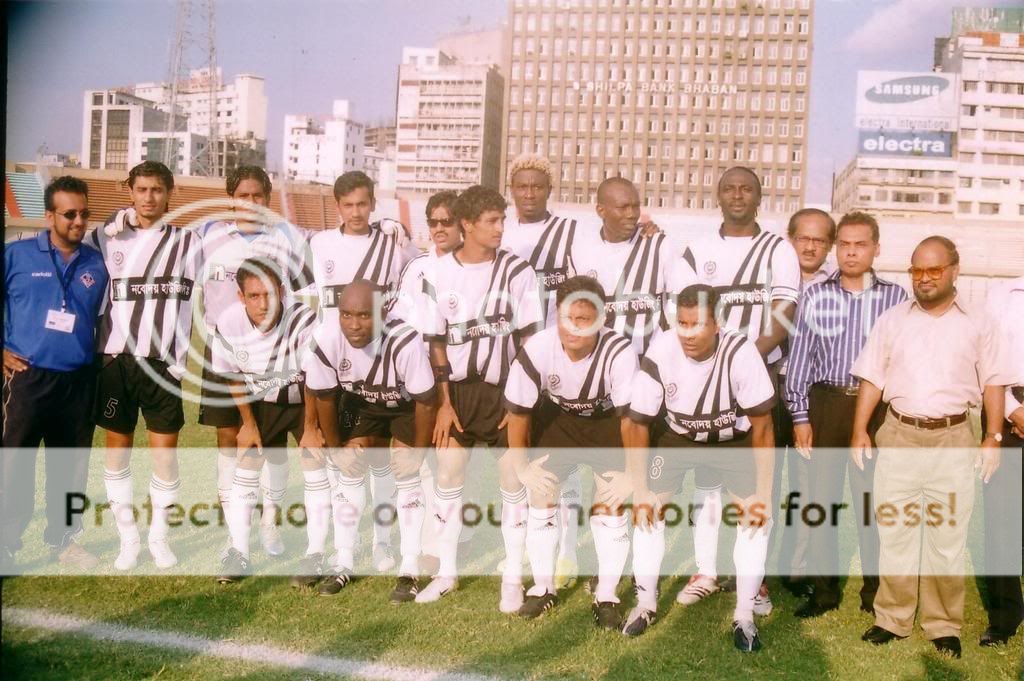 Mohammedan SC Dhaka Team
Mohammedan SC Dhaka Team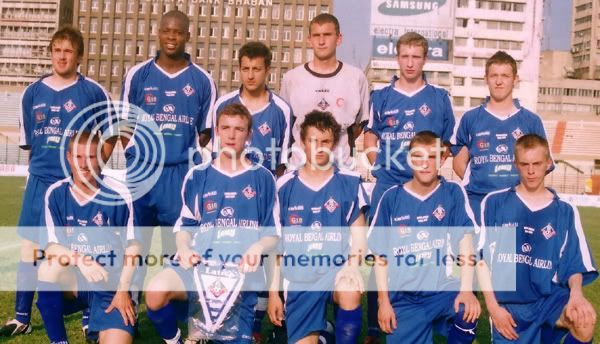 Oldham Athletic AFC Team
Oldham Athletic AFC Team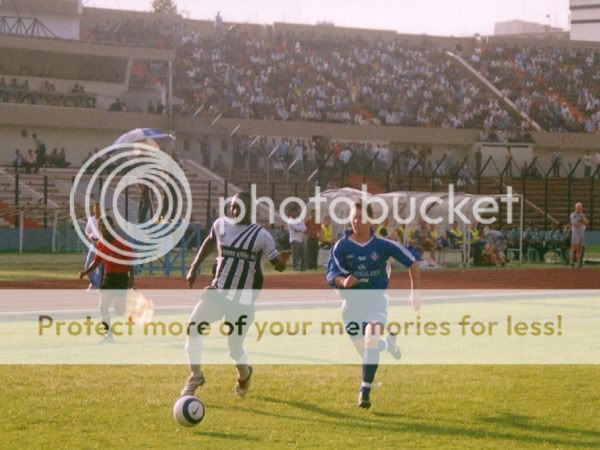 Oldham defender chases Mohammedan winger
Oldham defender chases Mohammedan winger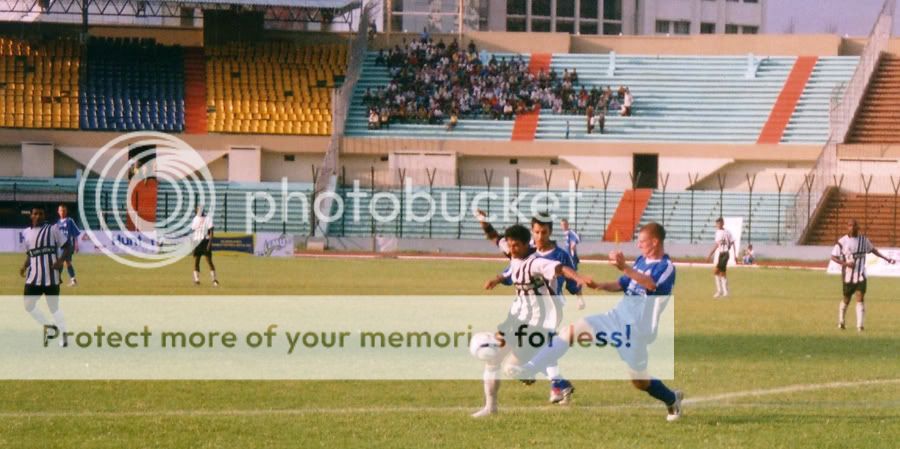 Mohammedan's defender forces the ball off the striker
Mohammedan's defender forces the ball off the striker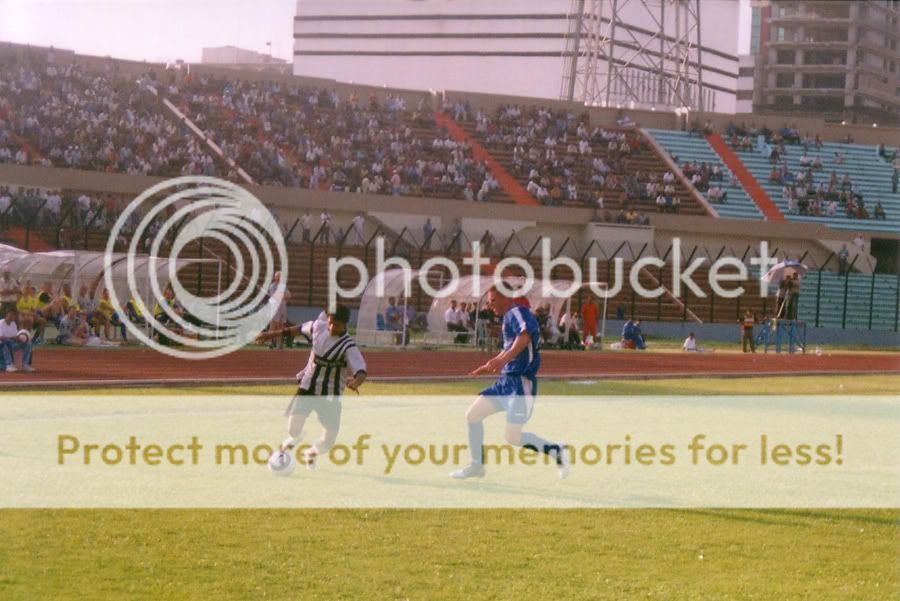 Mohammedan attacking down the flanks
Mohammedan attacking down the flanks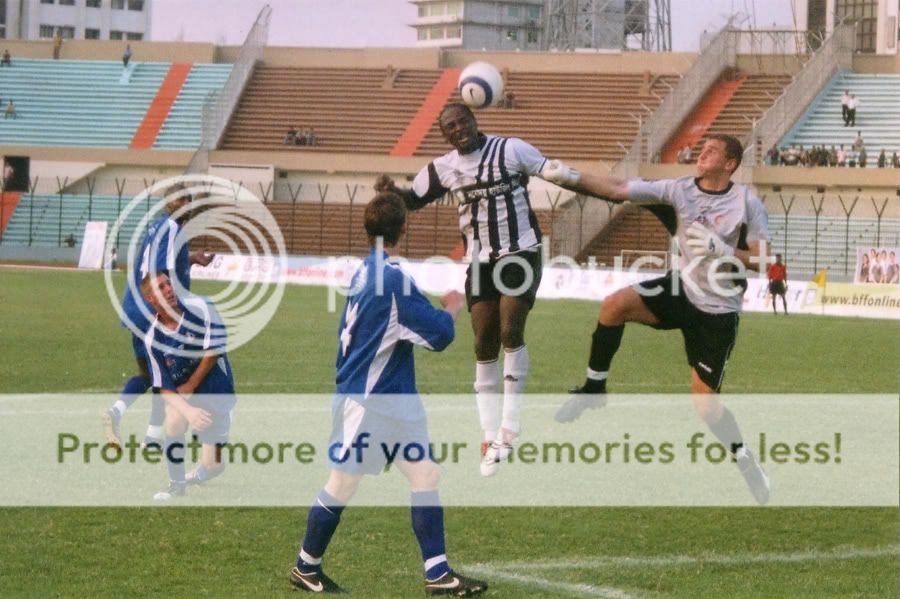 Nigerian Paul contests Oldham Athletic goal keeper, Ryan Smith, for the ball
Nigerian Paul contests Oldham Athletic goal keeper, Ryan Smith, for the ball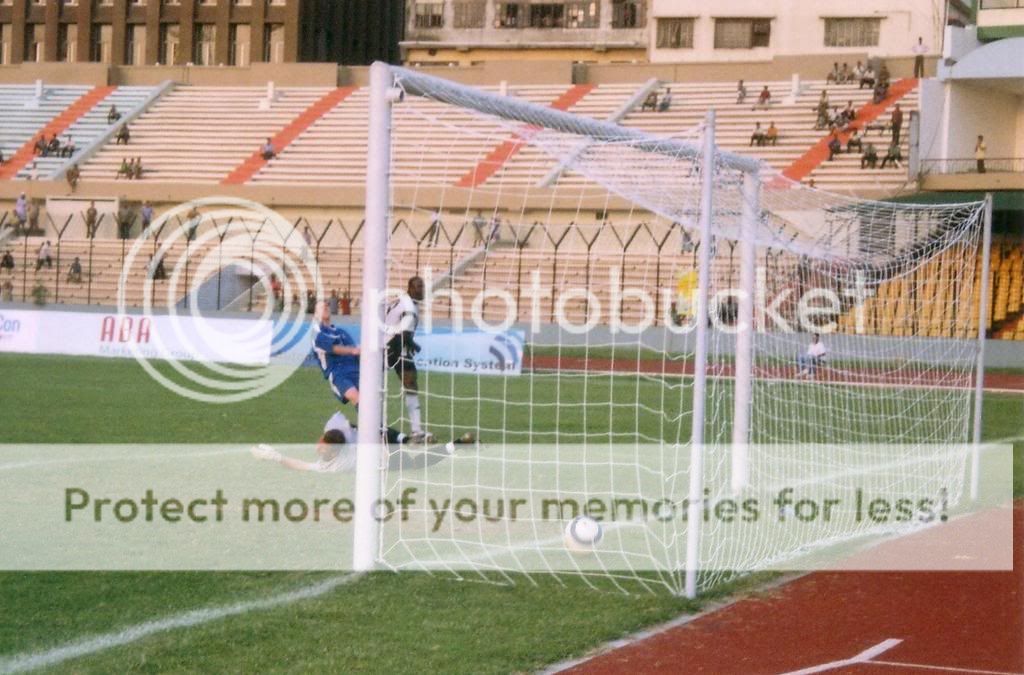 Paul slots in Mohammedan's second goal
Paul slots in Mohammedan's second goal




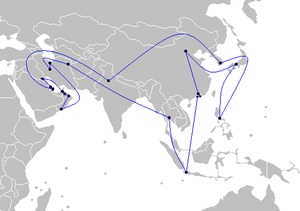



comment:
p_commentcount